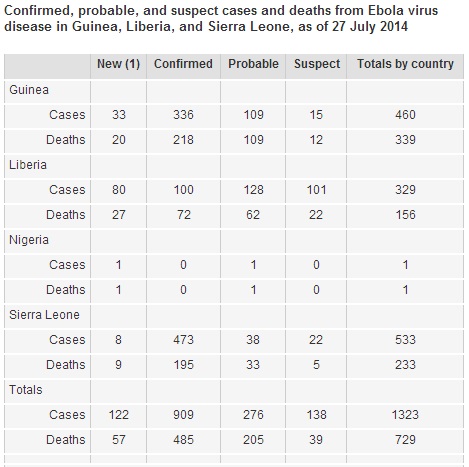No repatriation plan yet for Filipinos in Ebola-hit countries – DFA

The WHO continues to record rising numbers of Ebola cases and deaths in the West African countries of Guinea, Liberia, and Sierra Leone. Data from the WHO website
MANILA, Philippines – Amid the growing threat of Ebola Virus in West African countries, the Department of Foreign Affairs (DFA) will not yet implement repatriation measures for Filipinos there.
“The World Health Organization (WHO) has not yet declared an epidemic so we are waiting for a signal from them,” DFA spokesman Charles Jose said Monday when asked whether they will raise the crisis alert level from 2 (restriction phase) to 3 (voluntary repatriation).
Last July 2, the Philippines raised crisis alert level 2 in Guinea where there are 880 Filipinos, Sierra Leone (1,979 Filipinos), and Liberia (632 Filipinos including 148 United Nations peace keepers).
As of July 27, the WHO has recorded 1,323 total cases of Ebola in Guinea, Liberia, and Sierra Leone. The number of deaths is at 729 and continues to rise.
This is the worst outbreak of the deadly Ebola virus in history. Health officials have said that the virus was spreading faster than it could be contained.
“The Ebola epidemic trend in Guinea, Liberia, and Sierra Leone remains precarious with ongoing community and health-facility transmissions of infection. The surge in the number of new Ebola Virus cases calls for concentrated efforts by all to address the identified problems, such as health facility transmission and effective contact tracing,” the WHO said in its outbreak bulletin July 31, 2014.
“In an effort to accelerate the response to the current EVD outbreak in West Africa, the Director General of WHO and other senior managers continue to hold discussions with the donor community, development partners, and international agencies at a global level. Focus of the discussion has centered on the need to rapidly deploy additional human and financial resources that will help interrupt Ebola transmission and end the outbreak,” it said.
There is no known cure for the virus, which has a fatality rate of 90 percent.
The virus is transmitted through contact with bodily fluids of an infected person.
Symptoms include high fever and bleeding.
Jose assured that just like with the Middle-east Respiratory Syndrome-Coronavirus (MERS-COV), there will be strict screening of persons coming into the Philippines, including possible repatriates, to ensure the virus will not spread in the country.
RELATE STORIES
Why isn’t there a treatment or vaccine for Ebola?